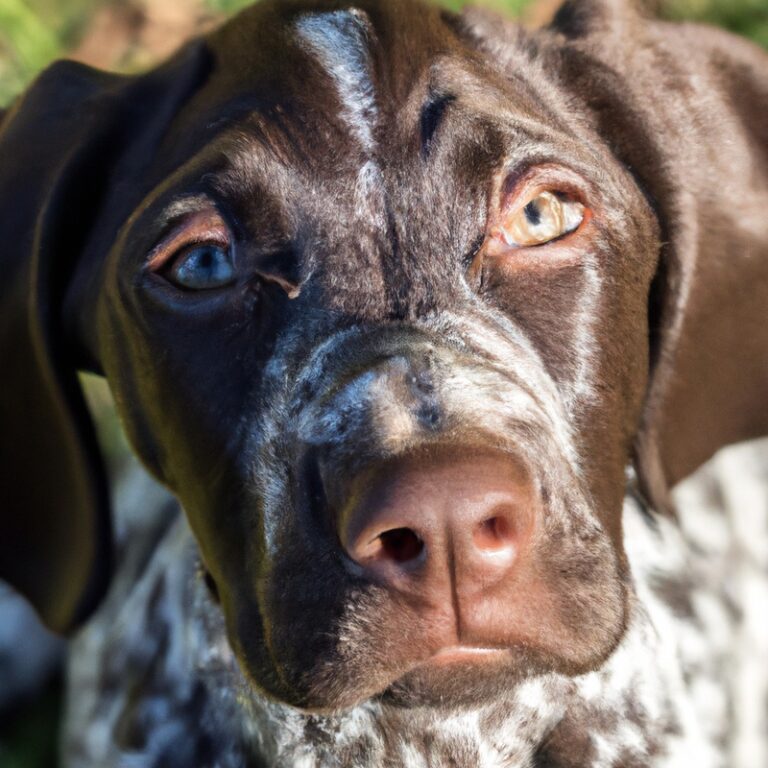What Are The Signs Of a German Shorthaired Pointer Having An Ear Infection?
Key Takeaways:
- Frequent shaking of the head
- Strong odor and discharge from the ear
- Redness and swelling of the ear canal
- Excessive scratching or rubbing of the affected ear
Are your German Shorthaired Pointer’s ears causing them discomfort? It’s not uncommon for these active and playful dogs to develop ear infections.
But how do you know if your furry friend is suffering from one?
In this article, I’ll walk you through the tell-tale signs of an ear infection in German Shorthaired Pointers, including redness, excessive scratching, and odor or discharge from the ear. We’ll also explore the risk factors, prevention and management strategies, and when it’s crucial to seek veterinary care.
So, if you want to keep your beloved pet’s ears healthy and infection-free, keep reading!
| Signs of German Shorthaired Pointer Ear Infection |
| Signs: |
| 1. Frequent scratching or rubbing of the affected ear(s) |
| 2. Head shaking or tilting to one side |
| 3. Ear redness or swelling |
| 4. Increased ear wax or discharge |
| 5. Foul odor coming from the ear |
| 6. Sensitivity or pain when the ears are touched |
| 7. Formation of crusts or scabs on the outer ear |
| 8. Hair loss or bald patches around the ears |
| 9. Changes in behavior, such as irritability or depression |
| 10. Loss of balance or coordination |
Signs and Symptoms of an Ear Infection in German Shorthaired Pointers
Redness and Swelling
Redness and swelling are two common signs of an ear infection in German Shorthaired Pointers. If you notice that your furry friend’s ear appears red or swollen, it could indicate an underlying infection.
Redness may be visible on the skin around the ear canal, while swelling can make the ear look puffy or enlarged.
These symptoms are often accompanied by discomfort or pain for your dog. It’s important to seek veterinary care if you observe redness and swelling, as prompt treatment can help alleviate your furry friend’s discomfort and prevent further complications.

Excessive Scratching or Shaking of the Head
Excessive scratching or shaking of the head is one of the common signs that your German Shorthaired Pointer may have an ear infection. Dogs often scratch or shake their heads to alleviate the discomfort caused by inflammation or irritation in the ears.
So, if you notice your GSP doing this frequently, it could be a red flag.
Keep in mind that excessive scratching or shaking can also be caused by other issues like allergies or foreign objects in the ears. If you suspect an ear infection, it’s best to consult with your veterinarian for a proper diagnosis and treatment.
Odor or Discharge from the Ear
One sign that your German Shorthaired Pointer may have an ear infection is if you notice an odor or discharge coming from their ear. This can be a clear indication that something is not right.
The odor may be unpleasant or unusual, and the discharge can range from a watery consistency to a thicker, pus-like substance.
It’s important to pay attention to any changes in the smell or discharge from your dog’s ear, as it could be a sign of infection or other underlying issue. If you notice these symptoms, it’s best to consult with your veterinarian for a proper diagnosis and treatment.
Pain or Sensitivity when Touching the Ear
Pain or sensitivity when touching the ear is often a clear sign of an ear infection in German Shorthaired Pointers. It’s one of the most common symptoms you may notice if your dog is dealing with this issue.
If your furry friend yelps, flinches, or shows discomfort when you touch their ear, it’s a good indication that they are experiencing pain or sensitivity in that area.
Paying attention to this sign can help you identify and address the problem promptly, ensuring your dog’s ear infection gets the attention it needs to heal.

Changes in Behavior or Activity Levels
When it comes to identifying an ear infection in your German Shorthaired Pointer, it’s important to pay attention to any changes in their behavior or activity levels. Dogs with ear infections may exhibit the following signs:
- Frequent scratching or rubbing of the affected ear(s
- Excessive head shaking or tilting to one side
- Ear sensitivity or pain, especially when touched
- Whining or whimpering
- Loss of balance or coordination
- Decreased appetite or reluctance to eat
- Irritability or aggression, particularly when the ears are touched
If you notice any of these changes in your dog’s behavior or activity levels, it’s best to consult your veterinarian for a proper diagnosis and treatment. They will be able to provide the necessary care to help your furry friend feel better.

Risk Factors for Ear Infections in German Shorthaired Pointers
Anatomy of German Shorthaired Pointer’s Ears
The anatomy of a German Shorthaired Pointer’s ears is an important aspect to consider when it comes to their overall health and well-being. First and foremost, these dogs have medium-sized, drop ears that hang close to their head.
This type of ear structure is prone to trapping moisture, dirt, and debris, which can increase the risk of ear infections.
Inside their ears, GSPs have a canal that leads to the eardrum. The canal is lined with sensitive skin and glands that produce wax to protect the ear from foreign particles.
However, an excess buildup of wax can also lead to ear problems.
The shape and positioning of the ear can make it difficult for proper air circulation, creating a favorable environment for bacteria and yeast to thrive. Regular cleaning and maintenance of their ears are crucial to prevent infections and maintain optimal ear health.
Monitoring your GSP’s ears for any signs of redness, swelling, discharge, or excessive scratching is important.
If you notice any of these symptoms, it’s best to consult your veterinarian for a proper diagnosis and treatment.
Water Activities or Exposure
Water activities or exposure can increase the risk of ear infections in German Shorthaired Pointers. These dogs are known for their love of water, but it’s important to be aware of the potential consequences.
When dogs spend time swimming, playing in lakes or ponds, or even just getting wet in the rain, water can get trapped in their ears.
This creates a moist environment that is ideal for bacteria and yeast to grow, leading to ear infections. It’s essential to take proper precautions to minimize the risk of ear infections in German Shorthaired Pointers during water activities or exposure.
After your dog has been in the water, make sure to thoroughly dry their ears using a clean towel.
Gently wipe away any excess moisture to prevent it from lingering in the ear canal. Additionally, consider using ear cleaner specifically formulated for dogs to help prevent infection.
Regular ear maintenance is crucial for dogs that engage in water activities or exposure.
By regularly checking and cleaning your German Shorthaired Pointer’s ears, you can catch any signs of infection early on. Look out for symptoms such as redness, swelling, discharge, foul odor, excessive scratching or pawing at the ears, and discomfort.
If you notice any of these signs, it’s best to consult with your veterinarian for proper diagnosis and treatment.
Allergies or Sensitivities
Allergies or sensitivities can be a common cause of ear infections in German Shorthaired Pointers. These dogs may develop allergic reactions to certain environmental factors like pollen, dust mites, or mold.
They can also be sensitive to certain ingredients in their food, such as grains or proteins.
If your German Shorthaired Pointer has allergies or sensitivities, they may exhibit signs like excessive scratching or itching, redness or inflammation in the ears, or a foul odor coming from the ears. It’s important to identify and address these allergies or sensitivities to prevent or treat ear infections in your furry friend.
Poor Ear Care or Hygiene
When it comes to ear infections in German Shorthaired Pointers, poor ear care or hygiene is a significant risk factor. First and foremost, neglecting regular cleaning and maintenance of the ears can lead to a buildup of dirt, wax, and bacteria.
This creates a perfect breeding ground for infection-causing organisms.
Not cleaning the ears properly or using harsh cleaning solutions can also irritate the sensitive ear canal. By incorporating proper ear care practices, such as regular cleaning with gentle solutions recommended by veterinarians, you can greatly reduce the risk of ear infections in your German Shorthaired Pointer.
Breed Predisposition
Breed predisposition refers to certain breeds of dogs being more prone to certain health conditions. In the case of German Shorthaired Pointers, they are known to have a higher risk of developing ear infections compared to other breeds.
This is due to their floppy ears and active outdoor lifestyle, which can lead to an accumulation of moisture, bacteria, and dirt in their ear canals.
It is important for German Shorthaired Pointer owners to be vigilant in monitoring their ears and taking preventative measures such as regular cleaning and drying to minimize the risk of ear infections.
Prevention and Management of Ear Infections in German Shorthaired Pointers
Regular Ear Cleaning
Regular ear cleaning is an important aspect of maintaining the overall health and well-being of your German Shorthaired Pointer. By cleaning their ears on a regular basis, you can help prevent the buildup of dirt, wax, and bacteria that can lead to ear infections.
First and foremost, it’s important to choose a gentle and vet-approved ear cleaning solution specifically designed for dogs.
Avoid using any harsh chemicals or homemade remedies that can potentially harm your dog’s delicate ears. To clean your German Shorthaired Pointer’s ears, start by gently lifting the ear flap and examining the inner surface.
Look for any redness, swelling, discharge, or foul odor, as these may indicate an infection or other underlying issue that requires veterinary attention.
Next, moisten a cotton ball or a soft cloth with the ear cleaning solution and gently wipe the visible area of the ear. Avoid inserting anything deep into the ear canal, as this can cause injury.
If your dog’s ears are particularly dirty or if they have a history of ear infections, it’s a good idea to consult with your veterinarian for guidance on a more thorough cleaning routine.
Avoiding Wet or Humid Environments
Avoiding wet or humid environments is crucial in preventing ear infections in German Shorthaired Pointers. These conditions create a breeding ground for bacteria and fungi, leading to increased risk of infection.
Here are some tips to help you protect your dog’s ears:
- Keep your German Shorthaired Pointer away from water sources such as lakes, ponds, and swimming pools. Moisture can easily get trapped in their ears and promote the growth of harmful microorganisms.
- Use a towel or a specially designed ear cleaner after bathing your dog to dry their ears thoroughly. Gently wipe the outer part of the ear, avoiding the ear canal.
- During rainy weather, try to limit your dog’s exposure to damp conditions. If your dog gets wet, dry their ears promptly with a towel to prevent moisture buildup.
- If your German Shorthaired Pointer loves to swim, consider using ear protection such as specially made earplugs for dogs. These can help prevent water from entering the ear canal.
Identifying and Treating Allergies
Identifying and Treating Allergies in German Shorthaired Pointers Identifying and treating allergies in German Shorthaired Pointers is important for their overall health and well-being. Allergies can cause discomfort and distress for your furry friend, but with proper identification and treatment, you can help them feel better.
First and foremost, look out for common signs of allergies in your German Shorthaired Pointer.
These may include excessive itching, redness or inflammation of the skin, recurrent ear infections, sneezing, coughing, or gastrointestinal issues. If you notice any of these symptoms, it’s essential to consult your veterinarian for a proper diagnosis.
Once allergies have been identified, your veterinarian may recommend a variety of treatment options.
These can include dietary changes, such as switching to a hypoallergenic food, or medications to manage symptoms like antihistamines or steroids. In some cases, your vet may also suggest allergy testing or immunotherapy to address the underlying cause of the allergies.
Regular Vet Check-ups and Maintenance
Regular vet check-ups and maintenance are essential for the overall well-being and health of your German Shorthaired Pointer. By scheduling regular appointments with your veterinarian, you can ensure that any potential issues, including ear infections, are caught early on and treated promptly.
During these check-ups, your vet will thoroughly examine your dog’s ears, checking for signs of infection such as redness, discharge, or a foul odor.
They may also recommend routine cleaning and maintenance techniques to prevent future infections.
Proper Grooming and Hair Removal
Proper grooming and hair removal play a crucial role in preventing ear infections in German Shorthaired Pointers. First and foremost, make sure to regularly clean and inspect your dog’s ears.
This includes gentle wiping with a soft cloth or ear wipes to remove dirt and debris.
Secondly, keep the hair around their ears trimmed short to promote proper air circulation and reduce moisture buildup. Additionally, plucking excess hair from the ear canal can help prevent blockages and improve ventilation.
By incorporating these grooming practices into your routine, you can help keep your German Shorthaired Pointer’s ears healthy and reduce the risk of infections.
When to Seek Veterinary Care for an Ear Infection in a German Shorthaired Pointer
Mild Symptoms vs. Severe Symptoms
Mild Symptoms vs. Severe Symptoms Let’s talk about the signs of an ear infection in your German Shorthaired Pointer.
Ear infections can range from mild to severe, and it’s important to be able to recognize the symptoms.
Mild symptoms may include your dog scratching or rubbing their ears more than usual, shaking their head, or having a slightly unpleasant odor coming from their ears. They may also show mild redness or irritation in the ear canal.
On the other hand, severe symptoms may indicate a more serious ear infection.
These can include intense scratching, head tilting or shaking, pain or discomfort when the ears are touched, thick discharge or pus, swelling or redness in the ear, and even hearing loss.
Duration and Persistence of Symptoms
Duration and Persistence of Symptoms: One key aspect to consider when it comes to ear infections in German Shorthaired Pointers is the duration and persistence of symptoms. Typically, the signs of an ear infection, such as itching, redness, odor, and discharge, may last for several days or even weeks if left untreated.
In some cases, the symptoms may come and go, but this doesn’t mean the infection has resolved on its own.
If your German Shorthaired Pointer shows signs of an ear infection that persist beyond a few days, it’s important to seek veterinary care. A veterinarian can examine your dog’s ears, diagnose the infection, and provide the appropriate treatment to prevent further discomfort and complications.
Health Risks of Untreated Ear Infections
Untreated ear infections in German Shorthaired Pointers can lead to several health risks. Firstly, the infection can spread to other parts of the ear, causing damage to the middle and inner ear structures.
This can result in permanent hearing loss or balance problems for your dog.
Additionally, untreated infections can lead to chronic inflammation, which can be painful and uncomfortable for your pet. In some cases, the infection can even spread to nearby tissues, causing more serious complications.
That’s why it’s crucial to seek veterinary care and treat ear infections promptly to prevent these health risks.
Importance of Professional Diagnosis and Treatment
When it comes to diagnosing and treating an ear infection in your German Shorthaired Pointer, professional care is key. First and foremost, a professional diagnosis is crucial for accurately identifying the type and severity of the infection.
Veterinarians have the knowledge and expertise to perform thorough examinations and tests to determine the cause of the infection, whether it’s due to bacteria, yeast, or other factors.
This ensures that the appropriate treatment is administered. Additionally, professional treatment is essential for effectively managing the ear infection.
Veterinarians can prescribe the right medications, such as antibiotics or antifungals, to target the specific cause of the infection and alleviate your dog’s discomfort.
They can also provide guidance on how to properly administer the medications and offer advice on ear cleaning techniques. By seeking professional diagnosis and treatment, you can ensure that your German Shorthaired Pointer receives the best care possible for their ear infection.
Treatment Options for Ear Infections in German Shorthaired Pointers
Medications and Topical Treatments
Medications and topical treatments play a vital role in treating ear infections in German Shorthaired Pointers. There are a few options that veterinarians commonly prescribe for these infections.
- Antibiotics: Oral antibiotics are often prescribed to eliminate bacteria causing the infection. It’s important to follow the full course of treatment to ensure complete recovery.
- Antifungal medications: If the infection is fungal in nature, antifungal medications may be prescribed to combat the fungi responsible.
- Ear drops: Topical ear drops can provide relief and help clear the infection. These drops usually contain antibiotics, steroids, or a combination of both. Make sure to administer them as directed by your vet.
- Cleaning solutions: Regularly cleaning your dog’s ears with veterinarian-recommended cleaning solutions can help prevent and control ear infections. Cleaning removes excess wax and debris, maintaining ear health.
Ear Flushes and Cleanings
Ear flushes and cleanings are important for maintaining the ear health of your German Shorthaired Pointer. They can help prevent and treat ear infections by removing dirt, debris, and excess wax from the ear canal.
First and foremost, it’s important to use a gentle, veterinarian-approved ear cleaner specifically designed for dogs.
Avoid using any harsh or irritating substances that could further irritate your dog’s ears. To perform an ear flush or cleaning, start by gently lifting your dog’s ear flap and carefully adding the recommended amount of ear cleaner into the ear canal.
Gently massage the base of the ear for about 30 seconds to help loosen any debris.
Next, you can use a clean cotton ball or gauze pad to gently wipe away any excess cleaner, wax, or debris from the outer part of the ear. Be careful not to insert anything into the ear canal, as this can cause injury or further irritation.
It’s important to note that ear flushes and cleanings should only be done as needed and as recommended by your veterinarian.
For dogs with chronic ear problems or recurring infections, your vet may provide more specific instructions or guidance. Remember to always consult a professional if you have any concerns or questions about your dog’s ear health.
Home Remedies and Natural Alternatives
Home remedies and natural alternatives can be effective in treating ear infections in German Shorthaired Pointers. Here are a few options you can try:
- Apple Cider Vinegar: Mix equal parts of apple cider vinegar and warm water. Use a dropper to apply a few drops into your dog’s ear canal. Gently massage the base of the ear to distribute the mixture. This can help restore the pH balance and reduce inflammation.
- Warm Compress: Applying a warm compress to your dog’s ear can help soothe pain and swelling. Ensure the compress is not too hot and hold it against the ear for a few minutes. This can provide relief and promote healing.
- Herbal Ear Cleaners: Some herbal ear cleaners contain natural ingredients like tea tree oil or witch hazel. These can help cleanse the ear and alleviate symptoms. Follow the instructions on the product for proper usage.
- Balanced Diet: Maintaining a balanced and healthy diet for your German Shorthaired Pointer can boost their immune system and help prevent ear infections. Consult with your vet for dietary recommendations.
Surgical Intervention
Surgical intervention is an option for treating ear infections in German Shorthaired Pointers that are severe or recurring. During the surgery, the veterinarian will clean the infected area and remove any foreign objects or blockages.
They may also repair any damage to the ear canal.
The goal of surgical intervention is to alleviate the pain and discomfort caused by the infection and to prevent further complications. It is important to consult with a veterinarian to determine if surgical intervention is the best course of action for your dog’s specific condition.
Final Verdict
Recognizing the signs of an ear infection in German Shorthaired Pointers is crucial for their overall health and well-being. By being attentive to redness, excessive scratching, odor, pain, or changes in behavior, we can identify and address this issue promptly.
Remember, preventative measures such as regular ear cleaning, avoiding wet environments, and addressing allergies are essential in minimizing the risk of infections.
However, if your German Shorthaired Pointer displays severe or persistent symptoms, seeking veterinary care is paramount to prevent further complications. Trust in professional diagnosis and treatment options to ensure the best outcome for your beloved furry companion.







